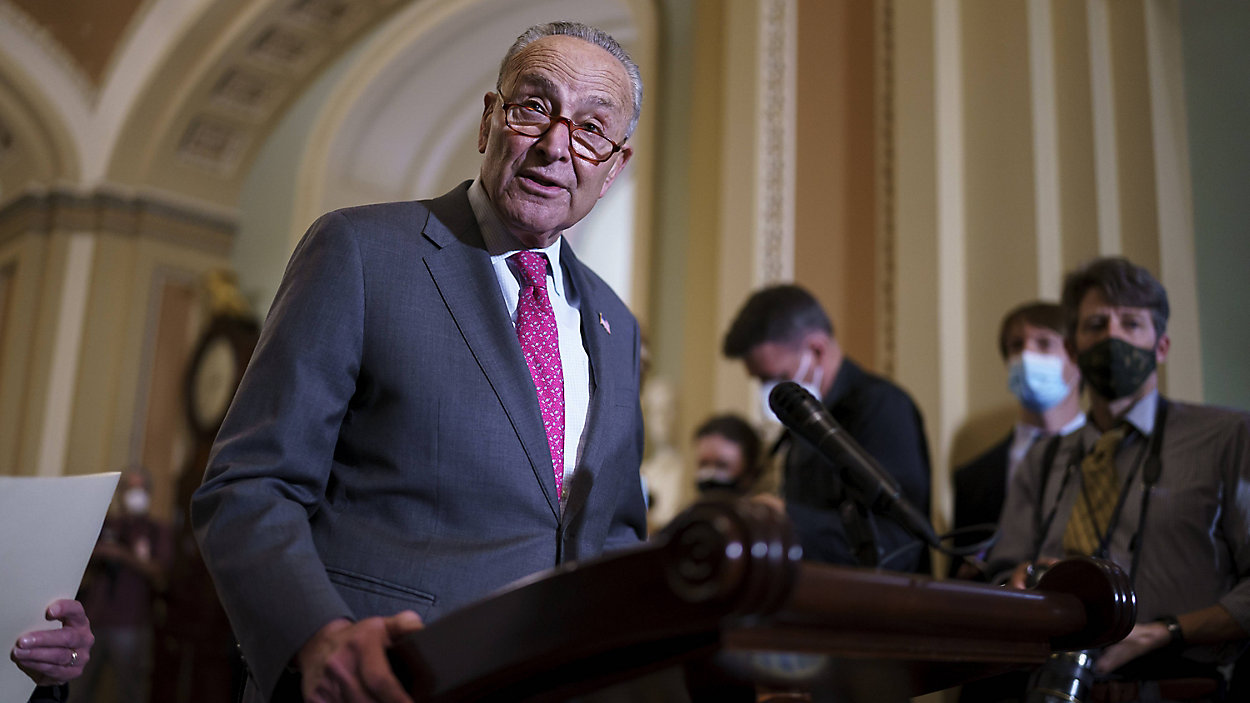NEW YORK — Senate Minority Leader Chuck Schumer’s once-formidable fundraising operation appears to be slowing, fueling speculation that Rep. Alexandria Ocasio-Cortez could mount a serious primary challenge against the longtime New York Democrat in 2026.
According to new data from the Federal Election Commission, Schumer raised just $133,000 during the most recent quarter — one of his weakest performances in more than a decade and a fraction of his usual totals during an election cycle.
By contrast, Ocasio-Cortez — the 36-year-old congresswoman representing parts of the Bronx and Queens — reported raising $4.5 million during the same three-month period for her House reelection campaign, while continuing to hint at ambitions beyond her current seat.
An Unusual Fundraising Gap
Campaign finance analysts say the disparity between the two Democrats is striking. Schumer, long known for his ability to attract support from Wall Street, real estate, and legal donors, typically brings in millions each quarter through both direct contributions and affiliated political committees.
His $133,000 haul from July through September marks less than half of what he raised during the same quarter in the lead-up to his 2022 reelection campaign. FEC data also show that his campaign spent roughly $322,000 during that period — meaning he outspent his own fundraising by more than double.
While Schumer’s campaign still reports $8.6 million cash on hand, Ocasio-Cortez’s reported $11.8 million represents a rare reversal: the junior House member now holds a larger war chest than one of the party’s most senior leaders.
“The fundraising imbalance sends a clear signal about where grassroots enthusiasm lies,” said one Democratic strategist familiar with New York politics. “AOC has the energy. Schumer has the establishment. And the establishment doesn’t inspire small-dollar donations the way it used to.”
Progressive Momentum Rising
Ocasio-Cortez has not announced a Senate campaign but has declined to rule out a challenge, fueling speculation within party circles. Her recent fundraising success — powered by digital donors and small contributions averaging less than $40 — mirrors the model that propelled her to national prominence in 2018.
“She’s a fundraising force because she connects with younger, online activists who see her as a voice for generational change,” said Adam Green, co-founder of the Progressive Change Campaign Committee. “There’s a big political and financial upside to being bold, and right now that accrues to AOC, not Chuck Schumer.”
Green added that “he cannot avoid noticing that AOC is the one inspiring people — and therefore getting the fundraising benefit.”
Political observers say that kind of enthusiasm could make Ocasio-Cortez a formidable opponent in a New York Democratic primary, particularly if Schumer’s base of institutional donors continues to cool.
A Generational Divide in the Party
The fundraising shift reflects broader dynamics shaping the Democratic Party. As progressives push for new leadership and younger candidates, long-serving figures like Schumer face pressure to adapt to a changing political landscape.
At 74, Schumer has served in the Senate since 1999 and held leadership roles for more than a decade. His allies say he remains focused on maintaining Democratic influence in the chamber and supporting vulnerable incumbents in other states.
“Chuck is focused on raising money for Senate 2026 candidates,” spokesman Angelo Roefaro said in a statement.
But inside the party, activists say Schumer’s cautious style and close ties to major industries risk alienating the next generation of voters and donors.
“Schumer’s connections to Wall Street and real estate were assets in the 1990s and 2000s,” said one Democratic strategist. “Now they’re liabilities in a political era defined by anti-establishment sentiment.”
Signs of a Possible Challenge
While Ocasio-Cortez has avoided confirming any plans to run statewide, her recent statements and appearances have kept speculation alive. During a recent town hall in Queens, she said she believes “New York deserves leadership that’s accountable to working families, not just donors.”
That comment, widely interpreted as a subtle jab at Schumer, was followed by a fundraising appeal that quickly raised more than $400,000 online.
Her team has also begun polling donors about potential “next steps” — a move that several analysts interpret as early-stage testing for a statewide campaign.
“AOC is clearly positioning herself,” said Hank Sheinkopf, a veteran Democratic consultant. “Even if she doesn’t run, the possibility alone gives her leverage inside the party.”
Schumer’s Longtime Donor Base Wavers
For decades, Schumer’s political strength has rested on his ability to bridge the party’s ideological divides and deliver resources to Democrats nationwide. As Senate Democratic leader, he’s cultivated deep relationships with financial and legal donors who have helped him fund campaigns across the country.
Those connections, however, may be losing potency. Several high-profile donors have recently redirected contributions toward newer progressive organizations or issue-based PACs.
“There’s a sense among some major donors that the party’s base is shifting, and they’re recalibrating accordingly,” said a political finance expert familiar with New York’s donor network.
Others note that Schumer’s attention has been divided by his leadership responsibilities — particularly his focus on recruiting and supporting candidates in competitive states such as Arizona, Pennsylvania, and Michigan.
Democratic Energy Moving Leftward
The Democratic Party’s internal dynamics have increasingly tilted toward figures like Ocasio-Cortez, whose online presence and direct engagement with voters have built an independent power base that bypasses traditional structures.
Her social media reach — with millions of followers across platforms — allows her to generate donations and mobilize supporters quickly. In contrast, Schumer’s political operation remains rooted in older methods of fundraising and coalition building.
Political analysts say that tension mirrors the broader generational rift shaping Democratic politics: between a traditional donor-driven establishment and a new, activist-oriented movement seeking to redefine the party’s priorities.
Strategists Urge Caution
Still, some insiders caution against reading too much into one quarter’s numbers. Schumer, they argue, has weathered slow fundraising periods before and has the institutional capacity to ramp up when needed.
“When he needs it, he’ll have it,” said Sheinkopf. “Schumer knows how to turn on the money machine. But this is a different era — and AOC represents the new energy.”
Party officials in New York also note that Schumer retains broad support among local leaders and continues to be one of the most influential fundraisers for Senate Democrats nationwide.
“He’s the linchpin for Senate campaigns across the country,” said a New York Democratic chair. “Nobody else can pick up the phone and raise for 10 candidates in a day the way he can.”
A Brewing Intraparty Showdown
Even so, the optics of the latest FEC filings have amplified talk of an intra-party showdown. Progressive groups are already framing a potential Schumer–Ocasio-Cortez primary as a test of whether the Democratic establishment can withstand a generational challenge.
“If AOC decides to run, it will be the biggest primary in modern Democratic history,” said a senior strategist aligned with the party’s left wing. “It’s not just about one seat — it’s about who controls the future direction of the party.”
Schumer’s allies remain confident, pointing to his record of legislative success and his deep institutional ties. But even they acknowledge that the senator’s next race may look very different from any he has faced before.
“This isn’t the same political environment as 2016 or 2022,” said one longtime fundraiser. “Grassroots energy can now outmatch traditional fundraising — and that’s something no incumbent can ignore.”
What Comes Next
For now, Ocasio-Cortez is publicly focusing on her 2026 House campaign, while continuing to build a national brand. But the gap between her fundraising totals and Schumer’s declining numbers ensures that speculation will continue.
In a party increasingly defined by generational turnover, that contrast could set the stage for a defining contest — one that tests whether traditional power or grassroots enthusiasm carries more weight in the modern Democratic Party.
As one strategist put it, “If AOC runs, it won’t just be a race for the Senate. It’ll be a referendum on the direction of the Democratic movement itself.”

James Jenkins is a celebrated Pulitzer Prize-winning author whose work has reshaped the way readers think about social justice and human rights in America. Raised in Atlanta, Georgia, James grew up in a community that instilled in him both resilience and a strong sense of responsibility toward others. After studying political science and creative writing at Howard University, he worked as a journalist covering civil rights issues before dedicating himself fully to fiction. His novels are known for their sharp, empathetic portraits of marginalized communities and for weaving personal stories with broader political realities. Jenkins’s breakout novel, Shadows of Freedom, won national acclaim for its unflinching look at systemic inequality, while his more recent works explore themes of identity, resilience, and the fight for dignity in the face of oppression. Beyond his novels, James is an active public speaker, lecturing at universities and participating in nonprofit initiatives that support literacy and community empowerment. He believes that storytelling is a way to preserve history and inspire change. When not writing, James enjoys jazz music, mentoring young writers, and traveling with his family to explore cultures and stories around the world.









